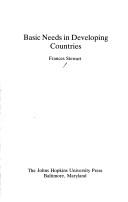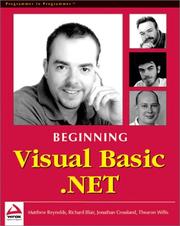| Listing 1 - 10 of 11518 | << page >> |
Sort by
|

ISBN: 0801823838 Year: 1985 Publisher: Baltimore Johns Hopkins university press
Abstract | Keywords | Export | Availability | Bookmark
 Loading...
Loading...Choose an application
- Reference Manager
- EndNote
- RefWorks (Direct export to RefWorks)
Book
Year: 2021 Publisher: Washington, D.C : World Bank,
Abstract | Keywords | Export | Availability | Bookmark
 Loading...
Loading...Choose an application
- Reference Manager
- EndNote
- RefWorks (Direct export to RefWorks)
Successful teachers are likely to be the first role models that young people encounter outside the home. They teach content, make learning fun, shape students' attitudes, exemplify empathy, teach teamwork and respect, and build student confidence in several ways. Effective teachers prepare students for a world where they must interact with others, adapt quickly to change, and where success will hinge on knowledge as well as attitudes and behavior. Helping young people develop these skills is a complex task, especially when many come from deprived backgrounds. It requires routine human interface with people who combine deep knowledge, a conviction that all students can succeed, and empathy. Successful teachers are irreplaceable in this task and will remain irreplaceable in the future. Coronavirus (COVID-19)-related school closures changed the nature of interactions between students and teachers around the world. While students in some school systems remained in regular contact with their teachers through technology-enabled classes and continued to learn, many did not. School closures will take place in the future, if not worldwide, then in individual countries for a variety of reasons. To be effective, teachers must also be able to use technology effectively to ensure learning beyond school walls, navigate unpredictable circumstances, and be flexible based on student needs. Teachers are successful when teacher policies are designed and implemented in a manner that attracts high-ability individuals, and prepares, supports and motivates them to become high performing teachers. This paper describes the vision and key principles guiding the world bank's support to countries on teachers.
Book
ISBN: 0801424488 0801499828 Year: 1991 Publisher: Ithaca : Cornell University Press,
Abstract | Keywords | Export | Availability | Bookmark
 Loading...
Loading...Choose an application
- Reference Manager
- EndNote
- RefWorks (Direct export to RefWorks)
Book
ISBN: 9039503036 Year: 1996 Publisher: Schoonhoven : Academic Service,
Abstract | Keywords | Export | Availability | Bookmark
 Loading...
Loading...Choose an application
- Reference Manager
- EndNote
- RefWorks (Direct export to RefWorks)
Book
ISBN: 3031410017 3031410009 Year: 2019 Publisher: Cham, Switzerland : Springer Nature Switzerland AG,
Abstract | Keywords | Export | Availability | Bookmark
 Loading...
Loading...Choose an application
- Reference Manager
- EndNote
- RefWorks (Direct export to RefWorks)
Book
ISBN: 9791032921005 Year: 2021 Publisher: Paris: Éd. de l'Observatoire,
Abstract | Keywords | Export | Availability | Bookmark
 Loading...
Loading...Choose an application
- Reference Manager
- EndNote
- RefWorks (Direct export to RefWorks)
Book
ISBN: 0197556256 0197556221 9780197556252 9780197556221 Year: 2023 Publisher: New York (N.Y.): Oxford University Press,
Abstract | Keywords | Export | Availability | Bookmark
 Loading...
Loading...Choose an application
- Reference Manager
- EndNote
- RefWorks (Direct export to RefWorks)
"Imagine getting $500 from the government, every month, deposited into your bank account. Once received, the money would be yours to do whatever you want with. You could buy groceries, pay for rent or childcare, save it, or blow it all in one big night out. How would a steady stream of income like that change your life? What if everybody in your society got it? How would it change our world? The idea you've just imagined has a name. Or, rather, it has several names. Some people call it a "guaranteed income." Others call it a "basic income." In this book, we'll adopt the most common label used today-a Universal Basic Income, or UBI for short. As we'll see in this book, the UBI is an idea that's been around for a long time-at least since the 18th century. But there has never been more interest in the idea than there is today. In 2016, Switzerland became the first country ever to hold a nationwide referendum on the UBI. The measure was defeated by a large margin, but this event would turn out to be just the beginning of a global wave of interest in the UBI. The Swiss referendum was followed quickly by pilot programs in Finland, the Netherlands, Scotland, and Ontario. In the United States, a UBI was the central policy proposal of Andrew Yang's 2020 presidential campaign. Yang's campaign attracted a horde of passionate followers-the "Yang Gang" as they were called-and sparked a nationwide conversation about the merits of a UBI. Today, many of those individuals have gone on to push for a UBI or other forms of cash transfers in different venues. Some are working with the organization Yang founded-Humanity Forward-to advocate a permanent extension of the fully refundable child tax credit-a kind of "UBI for kids." Others are working with Mayors for a Guaranteed Income, an organization that is currently sponsoring more than 40 different pilot programs in cities across the United States, from Los Angeles, California, to Providence, Rhode Island"--

ISBN: 1861004966 Year: 2001 Publisher: Birmingham : Wrox,
Abstract | Keywords | Export | Availability | Bookmark
 Loading...
Loading...Choose an application
- Reference Manager
- EndNote
- RefWorks (Direct export to RefWorks)
Book
ISBN: 9039518661 Year: 2002 Publisher: Schoonhoven : Academic Service,
Abstract | Keywords | Export | Availability | Bookmark
 Loading...
Loading...Choose an application
- Reference Manager
- EndNote
- RefWorks (Direct export to RefWorks)


ISBN: 1869140133 Year: 2002 Publisher: Pietermaritzburg : University of Natal press,
Abstract | Keywords | Export | Availability | Bookmark
 Loading...
Loading...Choose an application
- Reference Manager
- EndNote
- RefWorks (Direct export to RefWorks)
| Listing 1 - 10 of 11518 | << page >> |
Sort by
|

 Search
Search Feedback
Feedback About UniCat
About UniCat  Help
Help News
News